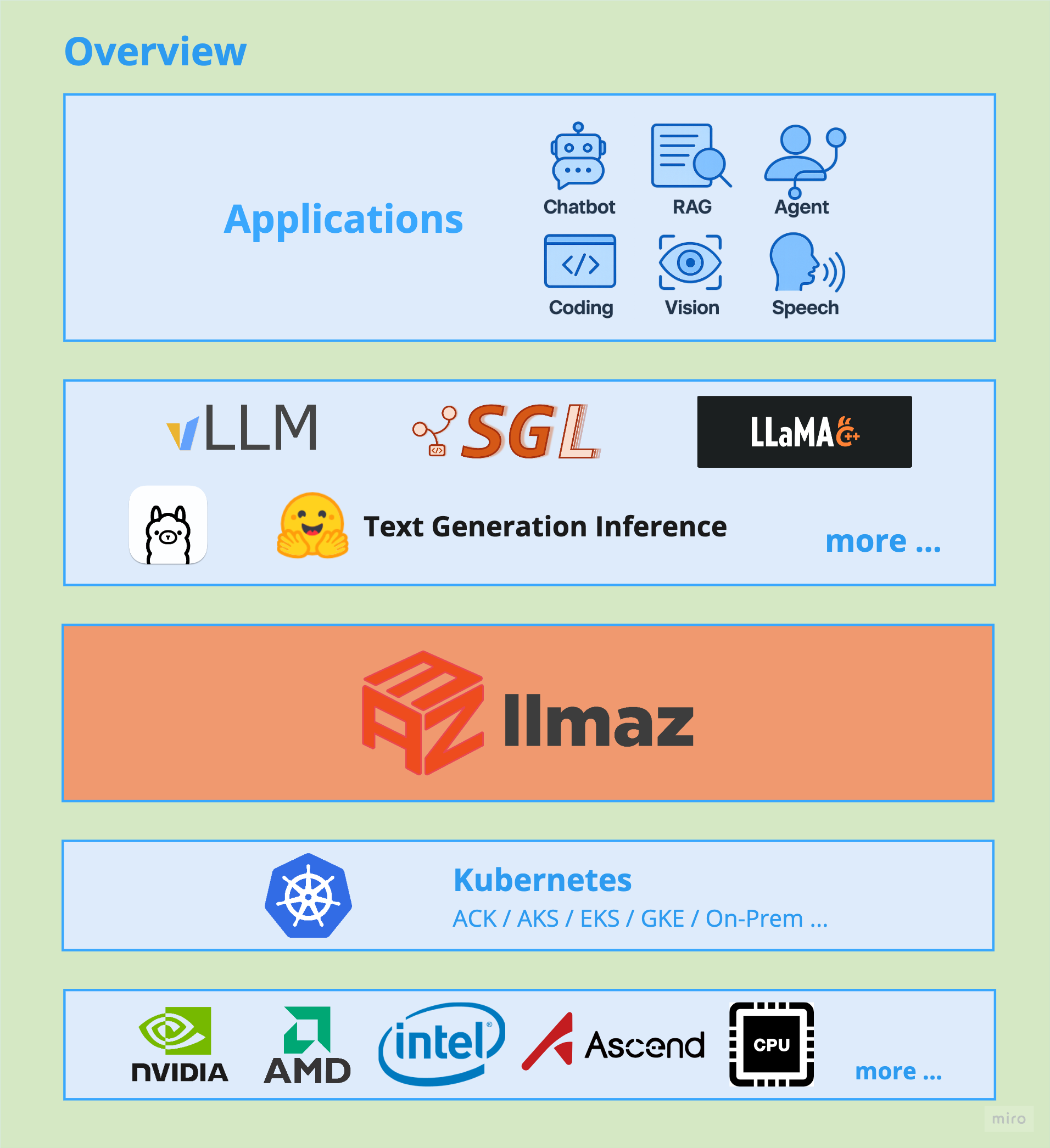
llmaz (pronounced /lima:z/), aims to provide a Production-Ready inference platform for large language models on Kubernetes. It closely integrates with the state-of-the-art inference backends to bring the leading-edge researches to cloud.
🌱 llmaz is alpha now, so API may change before graduating to Beta.


- Easy of Use: People can quick deploy a LLM service with minimal configurations.
- Broad Backends Support: llmaz supports a wide range of advanced inference backends for different scenarios, like vLLM, Text-Generation-Inference, SGLang, llama.cpp, TensorRT-LLM. Find the full list of supported backends here.
- Heterogeneous Cluster Support: llmaz supports serving the same LLM with heterogeneous devices together with InftyAI Scheduler for the sake of cost and performance.
- Various Model Providers: llmaz supports a wide range of model providers, such as HuggingFace, ModelScope, ObjectStores. llmaz will automatically handle the model loading, requiring no effort from users.
- Distributed Inference: Multi-host & homogeneous xPyD support with LWS from day 0. Will implement the heterogeneous xPyD in the future.
- AI Gateway Support: Offering capabilities like token-based rate limiting, model routing with the integration of Envoy AI Gateway.
- Scaling Efficiency: Horizontal Pod scaling with HPA with LLM-based metrics and node(spot instance) autoscaling with Karpenter.
- Build-in ChatUI: Out-of-the-box chatbot support with the integration of Open WebUI, offering capacities like function call, RAG, web search and more, see configurations here.
Read the Installation for guidance.
Here's a toy example for deploying facebook/opt-125m, all you need to do
is to apply a Model and a Playground.
If you're running on CPUs, you can refer to llama.cpp.
Note: if your model needs Huggingface token for weight downloads, please run
kubectl create secret generic modelhub-secret --from-literal=HF_TOKEN=<your token>ahead.
apiVersion: llmaz.io/v1alpha1
kind: OpenModel
metadata:
name: opt-125m
spec:
familyName: opt
source:
modelHub:
modelID: facebook/opt-125m
inferenceConfig:
flavors:
- name: default # Configure GPU type
limits:
nvidia.com/gpu: 1apiVersion: inference.llmaz.io/v1alpha1
kind: Playground
metadata:
name: opt-125m
spec:
replicas: 1
modelClaim:
modelName: opt-125mBy default, llmaz will create a ClusterIP service named like <service>-lb for load balancing.
kubectl port-forward svc/opt-125m-lb 8080:8080curl http://localhost:8080/v1/modelscurl http://localhost:8080/v1/completions \
-H "Content-Type: application/json" \
-d '{
"model": "opt-125m",
"prompt": "San Francisco is a",
"max_tokens": 10,
"temperature": 0
}'Please refer to examples for more tutorials or read develop.md to learn more about the project.
- Serverless support for cloud-agnostic users
- Prefill-Decode disaggregated serving
- KV cache offload support
- Model training, fine tuning in the long-term
Join us for more discussions:
All kinds of contributions are welcomed ! Please following CONTRIBUTING.md.
We also have an official fundraising venue through OpenCollective. We'll use the fund transparently to support the development, maintenance, and adoption of our project.

